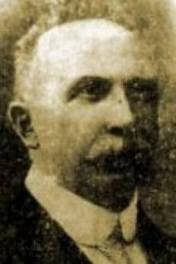
Giacomo Gorrini
(1859, Molino dei Torti - 1950, Rome)
An Italian diplomat and an intellectual, with several degrees to his name, he was the founder and first director of the Italian Foreign Ministry Archives in 1886.
From 1911 to 1915 Gorrini served as Italian Consul in Trabzon, including the provinces of Erzrum, Van, Bitlis, Svas and Trabzon, and was eyewitness to the massacres and deportation of the Armenians. In August 1915, when Italy declared war on Turkey, Gorrini was forced to leave Trabzon.
During the First World War, he used press articles and numerous interviews to denounce the Turkish rulers' criminal acts against the Armenians, describing all the horrors of the genocide directed against them. "If everybody had known what I know and had seen what I have seen with my own eyes and heard with my own ears", said Gorrini, "while still maintaining their neutrality, all Christians would have risen up against Turkey, cursed its inhuman government, its ferocious 'Union and Progress' committee and their allies and would have held them accountable. With their connivance and support, news of these foul crimes, unprecedented in both the past and recent history of mankind, is being suppressed".
After his return to Italy in May 1915 he gave an interview to the Italian newspaper Il Messaggero (August 1915) about the Armenian massacres reported in Bryce's Blue Book, as well as by Johannes Lepsius and Osip Mandelstam.
During his journey back to Italy, together with American Ambassador Morgenthau and the Vatican's Monsignor Dolci he saved 50,000 Armenians from deportation. From 1918 to 1920 he was Ambassador Extraordinary and Plenipotentiary of Italy to the Independent Republic of Armenia, and the only ambassador of all the Western Powers in that short-lived Republic of Armenia. At that time Giacomo Gorrini tried to organize the intervention of two Italian warships in aid of the Armenians, but the operation was halted at the last minute by the newly appointed Italian Foreign Minister.
In 1920 Gorrini wrote a Memorandum for the Treaty of Serves in which he proposed that the Italian government should unreservedly support the independence of Armenia, including Kilikia. In his concluding remark, Gorrini stated: "If we don't solve the problem of Armenia, even partially, peace will be periodically disturbed throughout the world".
From 1920 to 1940 he helped many Armenians to migrate from Turkey to Italy. He also rescued a young Armenian girl from Bayburt who stayed with him till his death.
In 1940, at the age of 80, while the world was on the brink of catastrophe, he published a book of first-hand accounts of the Armenian question, calling on international justice to acknowledge the genocide and the rights of the Armenian people.
(1859, Molino dei Torti - 1950, Rome)
An Italian diplomat and an intellectual, with several degrees to his name, he was the founder and first director of the Italian Foreign Ministry Archives in 1886.
From 1911 to 1915 Gorrini served as Italian Consul in Trabzon, including the provinces of Erzrum, Van, Bitlis, Svas and Trabzon, and was eyewitness to the massacres and deportation of the Armenians. In August 1915, when Italy declared war on Turkey, Gorrini was forced to leave Trabzon.
During the First World War, he used press articles and numerous interviews to denounce the Turkish rulers' criminal acts against the Armenians, describing all the horrors of the genocide directed against them. "If everybody had known what I know and had seen what I have seen with my own eyes and heard with my own ears", said Gorrini, "while still maintaining their neutrality, all Christians would have risen up against Turkey, cursed its inhuman government, its ferocious 'Union and Progress' committee and their allies and would have held them accountable. With their connivance and support, news of these foul crimes, unprecedented in both the past and recent history of mankind, is being suppressed".
After his return to Italy in May 1915 he gave an interview to the Italian newspaper Il Messaggero (August 1915) about the Armenian massacres reported in Bryce's Blue Book, as well as by Johannes Lepsius and Osip Mandelstam.
During his journey back to Italy, together with American Ambassador Morgenthau and the Vatican's Monsignor Dolci he saved 50,000 Armenians from deportation. From 1918 to 1920 he was Ambassador Extraordinary and Plenipotentiary of Italy to the Independent Republic of Armenia, and the only ambassador of all the Western Powers in that short-lived Republic of Armenia. At that time Giacomo Gorrini tried to organize the intervention of two Italian warships in aid of the Armenians, but the operation was halted at the last minute by the newly appointed Italian Foreign Minister.
In 1920 Gorrini wrote a Memorandum for the Treaty of Serves in which he proposed that the Italian government should unreservedly support the independence of Armenia, including Kilikia. In his concluding remark, Gorrini stated: "If we don't solve the problem of Armenia, even partially, peace will be periodically disturbed throughout the world".
From 1920 to 1940 he helped many Armenians to migrate from Turkey to Italy. He also rescued a young Armenian girl from Bayburt who stayed with him till his death.
In 1940, at the age of 80, while the world was on the brink of catastrophe, he published a book of first-hand accounts of the Armenian question, calling on international justice to acknowledge the genocide and the rights of the Armenian people.
